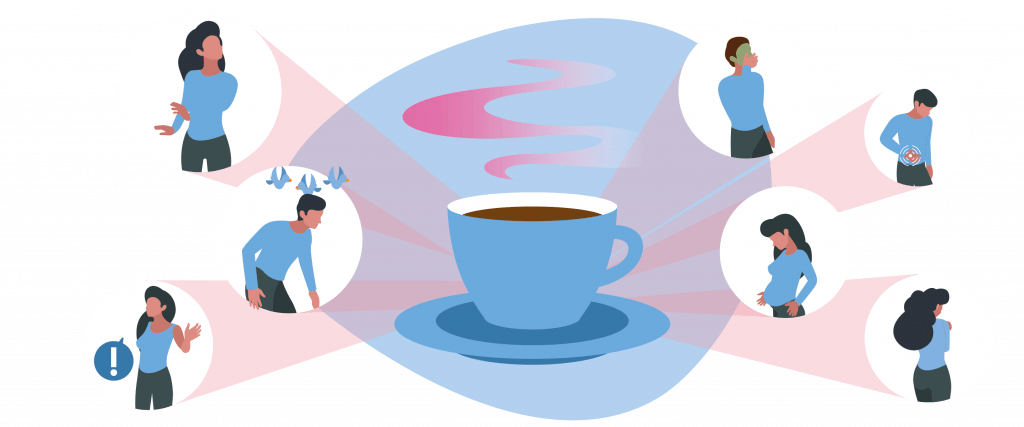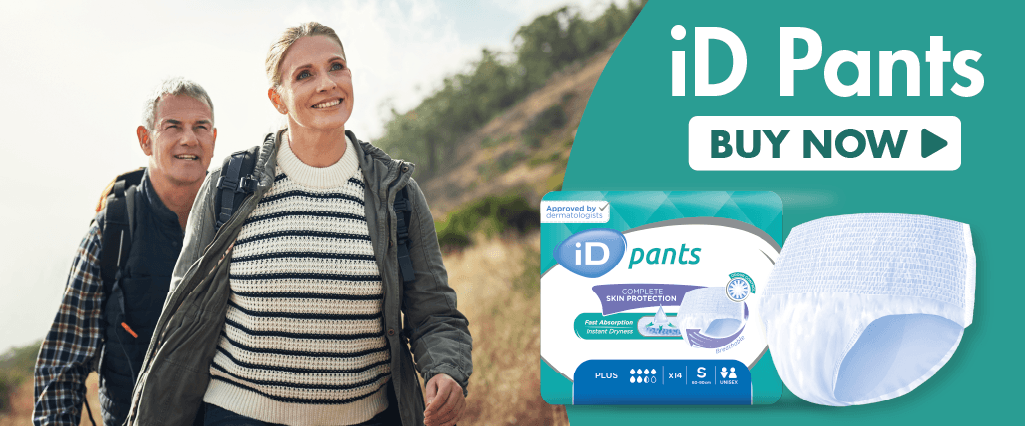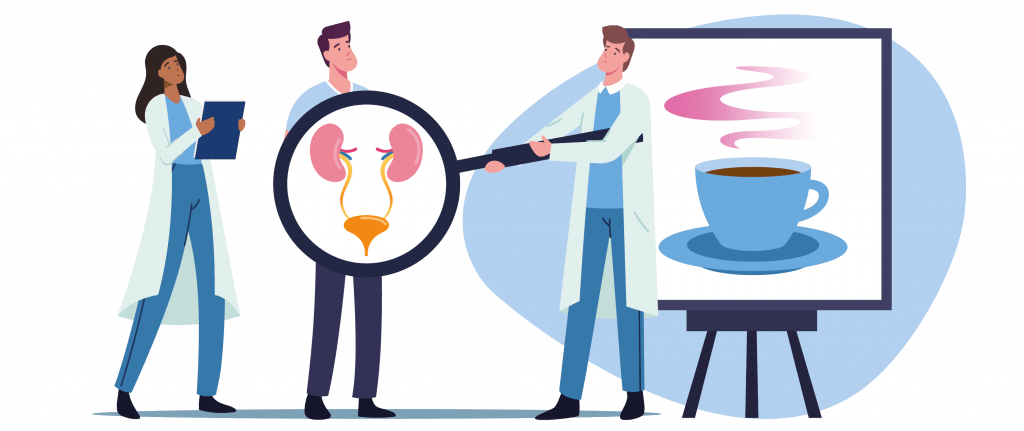The impact of (decaf) coffee on bladder problems and the body
It’s widely known that you should limit your caffeine intake for a variety of health reasons, such as sleep, anxiety and stomach health. Furthermore, it can also have an effect on your bladder health. However, it’s commonly believed decaf coffee is easier on the body, including being less likely to cause bladder problems. Is the caffeine in coffee the issue, or can decaf coffee cause equal harm?
What is the impact of coffee on the body?
Many of us enjoy our morning cup of joe and even rely on it to wake up and get going. It’s believed that 2.2 billion cups of coffee are consumed in the world every year and fun fact, in Europe, Finns have the highest per capita consumption, drinking 12kg of the stuff annually!1 But what is the caffeine in coffee doing to your body?

Caffeine is a nervous system stimulant2, meaning that it increases the levels of certain chemicals in the brain, causing a rise in alertness, attention, energy and physical activity3. As such, consuming too much caffeine (in drinks such as coffee, tea and fizzy drinks) has lots of different effects on the body, including:
- increased heart rate
- headaches and confusion
- irritability
- nausea and vomiting
- fertility and pregnancy issues
- jitters
- increased blood pressure4

Does caffeine impact the bladder?
In addition to the above, caffeine can also impact the bladder. Coffee consumption can increase the frequency or urgency of urination because it relaxes your pelvic and urethral muscles.5 It can also irritate your bladder due to its acidity.6 Read more here about why acidity is bad for your bladder and what other dietary changes you can make to improve your bladder health.
Because of all these health impacts, it’s recommended that you drink a maximum of four to five cups of coffee a day or a maximum of 400mg of caffeine7. However, if you have an overactive bladder or other bladder problems, then it is recommended that you reduce or completely avoid caffeine8.

How does decaf coffee differ, and how does it affect the body?
Contrary to popular belief, decaf coffee is not 100% caffeine free. The decaffeination process removes around 97% of the caffeine in the coffee, leaving about 7mg in a cup of decaf coffee, compared to 70-140mg in a cup of regular coffee.9 For comparison, a cup of black tea contains, on average, 47mg of caffeine.10
In terms of impact on the body, the effects from caffeine mentioned above are naturally less if you drink decaf coffee because the amount of caffeine you are consuming is a lot smaller. Furthermore, there are even some health benefits associated with drinking decaf coffee, including:
- prevention of heart disease, cancer and type 2 diabetes, thanks to the antioxidants and nutrients in decaf coffee
- positive effects on age-related mental decline (possibly preventing diseases like Alzheimer’s and Parkinson’s)
- reduced heartburn symptoms compared to caffeinated coffee11
When it comes to bladder problems, the negative impact is unfortunately still present when you drink decaf coffee. It’s certainly correct that it’s less likely to increase the urgency or frequency of your peeing, as it contains very little caffeine. However, it’s still very acidic, which can irritate the bladder12, and may cause other issues, such as bladder leaks. If you or your loved one are experiencing urine leaks, then try iD’s range of continence products. Discreet, comfortable and odour-controlling, you can shop our range here.
So, to sum up, decaf coffee boasts some benefits to your health as well as avoiding several of the negative side effects of caffeinated coffee. However, if you find that coffee, in general, irritates your bladder, it may be worth avoiding decaf coffee as well.

Sources
1 “HOW EUROPEANS TAKE THEIR COFFEE”, Expertise in Labour Mobility, 1 October 2019, Source: https://www.labourmobility.com/international-coffee-day-europe-culture/
2 “The Effects of Caffeine on Your Body”, Ann Pietrangelo, 28 September 2018, Source: https://www.healthline.com/health/caffeine-effects-on-body
3 “central nervous system stimulant”, National Cancer Institute, n.d., Source: https://www.cancer.gov/publications/dictionaries/cancer-terms/def/central-nervous-system-stimulant
4 “The Effects of Caffeine on Your Body”, Ann Pietrangelo, 28 September 2018, Source: https://www.healthline.com/health/caffeine-effects-on-body
5 “How drinks affect your bladder and bowel”, NHS, n.d., Source: https://www.guysandstthomas.nhs.uk/resources/patient-information/elderly-care/How-drinks-affect-your-bladder-and-bowel.pdf
6 “Caffeine: It could be affecting your bladder”, NHS, n.d., Source: https://publicdocuments.sth.nhs.uk/pil2858.pdf
7 “How much coffee is safe?”, Philippa Roxby, 1 December 2011, Source: https://www.bbc.co.uk/news/health-15982904
8 “11 Foods to Avoid if You Have OAB”, Ryan Wallace, 28 September 2017, Source: https://www.healthline.com/health/11-foods-to-avoid-if-you-have-oab
9 “How Much Caffeine Is in Decaf Coffee?”, Amy Goodson, 15 September 2018, Source: https://www.healthline.com/nutrition/caffeine-in-decaf
10 “How much caffeine is in tea?”, Nicola Shubrook, 30 April 2020, Source: https://www.bbcgoodfood.com/howto/guide/how-much-caffeine-tea
11 “Decaf Coffee: Good or Bad?”, Adda Bjarnadottir, 29 July 2020, Source: https://www.healthline.com/nutrition/decaf-coffee-good-or-bad
12 “Caffeine: It could be affecting your bladder”, NHS, n.d., Source: https://publicdocuments.sth.nhs.uk/pil2858.pdf

1 Comment
That was extremely helpful! Decaf coffee has roughly 97 percent of the caffeine removed, resulting in a decreased negative impact on our body. Other health benefits include improved sleep, less anxiety, mild weight loss, and lower acidity. Of course, the best thing is that decaffeinated coffee is safe to consume and may be included in a balanced diet.